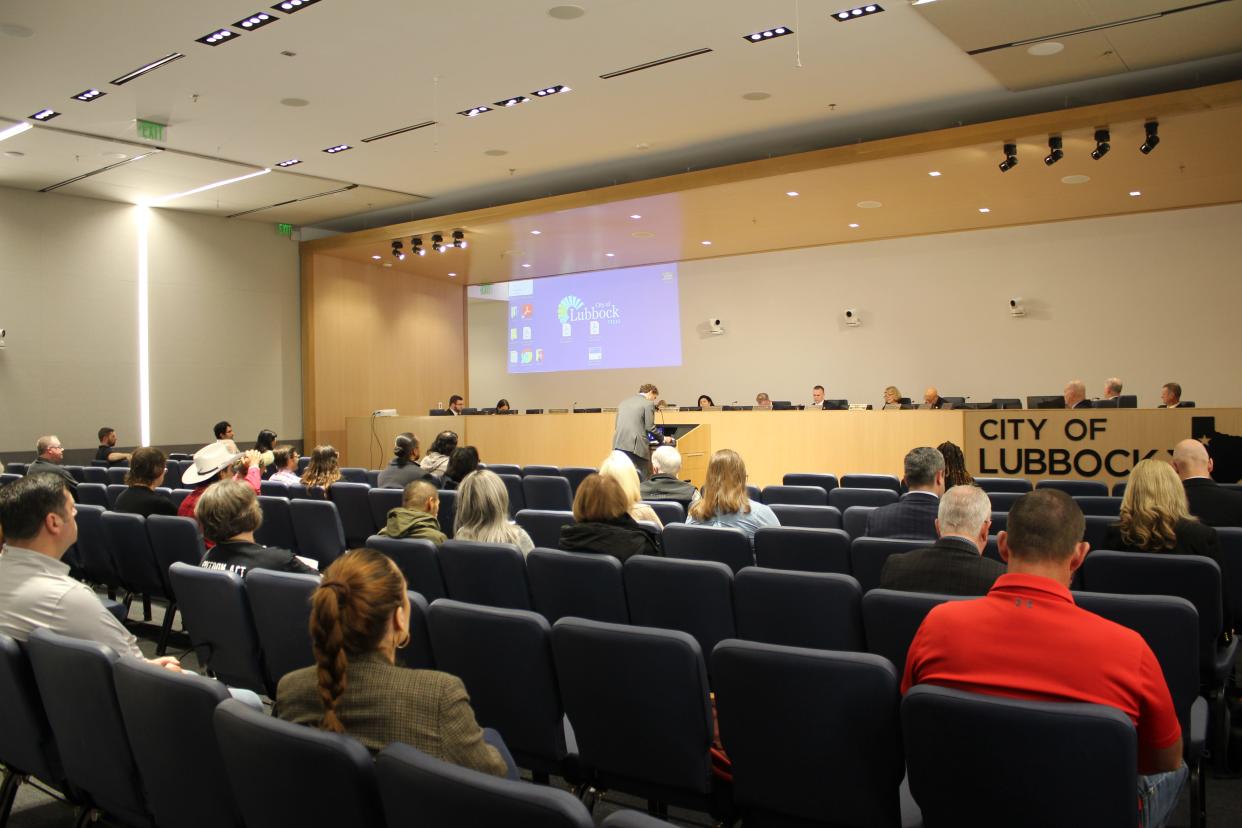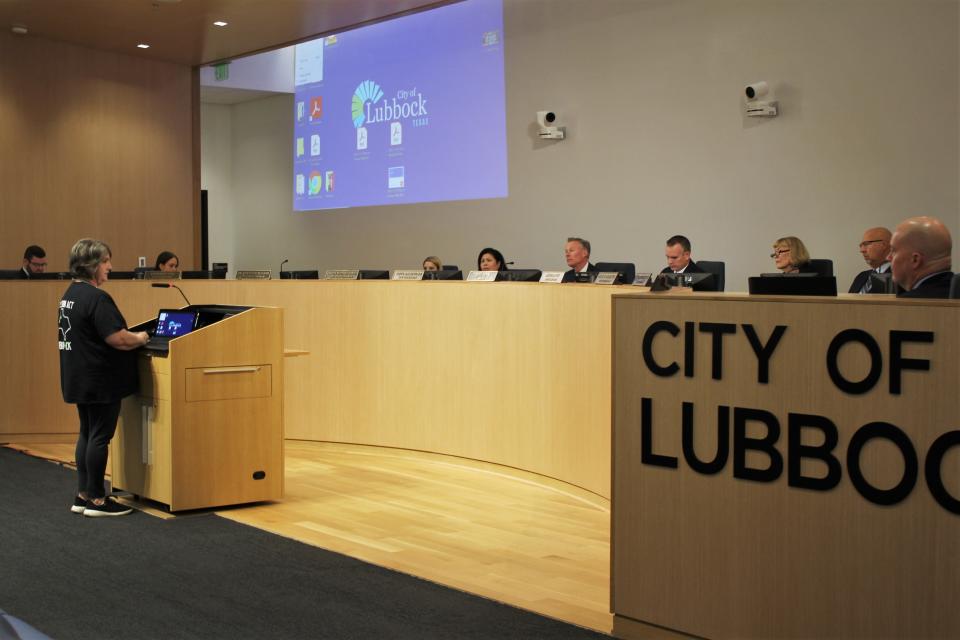Lubbock City Council unanimously rejects marijuana decriminalization ordinance

The Lubbock City Council on Tuesday unanimously rejected a citizen initiative aiming to decriminalize low-level marijuana possession in the city limits, likely sending the issue to a citywide vote.
Citizens had an opportunity to comment on the "Freedom Act" ordinance before the council recessed into executive session and returned to vote. The statutorily required vote whether to adopt the ordinance as presented failed 0-7.
The proposed ordinance would decriminalize the possession of less than 4 ounces of marijuana and marijuana paraphernalia within the Lubbock city limits. The ordinance would also prevent law enforcement officers from using marijuana odor alone as probable cause for a search.
The vote comes after an initiating committee collected more than 5,000 valid petition signatures in support of the ordinance, triggering a required city council vote under a provision in the Lubbock city charter. The committee now has the option to request a citywide vote on the proposition.
Citizen-led decriminalization effort
The scene at Citizens Tower Tuesday morning was in stark contrast to a hearing in 2020 for the most recent successful initiative, a "Sanctuary City For the Unborn" ordinance that outlawed abortion in the city limits. During that hearing, around 150 spoke for more than 5 1/2 hours on the topic, according to A-J archives.
More: Freedom Act Lubbock surpasses goal for petition to decriminalize marijuana in city
On Tuesday, just nine citizens rose to speak — seven in favor and two in opposition — for about 45 minutes collectively.
Proponents of the legislation — who argued it would free up city and county resources to focus on more serious crimes while alleviating historic burdens on people of color who they say are disproportionately affected by marijuana laws — said they believe the ordinance is legal and relayed stories of citizens they encountered during the petition process.
"This is an ordinance crafted for Lubbock with many provisions within it meant to align to our own city's policies, the character and nature of our city," said Joshua Shankles, a member of the Lubbock Compact-affiliated initiating committee.
"We heard so many stories of capricious enforcement of (marijuana laws) within our own city," Shankles said. "What we're attempting to do here is slide a floor under this and create equal protection of the law and equal application of the law in our city in a way that we're currently not seeing and experiencing, or at least (that) is the testimony of the many, many people that we interacted with."
Shankles said he has found many folks he's interacted with of various backgrounds support the cause.
"Probably the bigger bucket of signatories on here are people who have no experience with marijuana or any cannabis product whatsoever. They're just people that don't want their neighbors to go to jail over something that nobody gives a hoot about anymore," he said.
Another citizen speaking in favor of the ordinance said his late son dealt with severe epilepsy and may have survived with access to medical cannibis.

Opponents of the proposal shared concerns about safety and substance abuse.
"I have a lot of family, a lot of friends, and I don't want them killed by somebody that wants to take marijuana," said Lubbock citizen Don Enger. "And we all know that the four ounces that we're talking about, that's just a start. If you vote to go along with that, they'll be back in no time at all saying we need to raise that or do completely away."
Another citizen, Terisa Clark, shared an anecdote of a family member she says began using marijuana at age nine, leading to escalating substance abuse and an eventual violent death.
In a seemingly counterintuitive move, Adam Hernandez, also a member of the initiating committee, suggested the council vote the ordinance down.
"We feel that this issue is too complex, too nuanced. It impacts too many people in too many ways for this decision to rests on your shoulders. I don't think that's fair to you, and I don't think it's fair to our public," Hernandez told the council. "So I hope that you all will vote this down here today, for whatever reason you may want to do that or not, so that we can put this to the ballot so the people can make that decision."
Council rejects marijuana ordinance
The council's rejection of the ordinance was apparently not a response to Hernandez's appeal, however, but rather to councilmembers' beliefs the legislation is unconstitutional.
"My conclusion is that the proposed ordinance actually violates the Texas Constitution, is in direct conflict with state law and therefore it's void and unenforceable," Mayor Tray Payne said. "Any change to the laws of the state in regards to the possession of marijuana must be addressed by the Texas Legislature."
Several councilmembers echoed Payne's comments, adding they believe their oaths of office, which compel them to upload the constitutions and laws of Texas and the United States, bar them from adopting the ordinance.
Councilwoman Christy Martinez-Garcia said she rejects the notion marijuana laws disproportionately affect people of color and other minority groups, claiming the organizers were spreading "misinformation."
"I want to see the numbers, I want to see the ethnic breakdown of the people that are being given citations for this claim that you've had to make, and I haven't seen the numbers reflected that you claim," Martinez-Garcia said.
"If there's discrimination, I guarantee I'm going to call on it. I think that our community is dealing with a lot of different issues, and they have a lot of needs," the councilwoman added. "I would like to see you work on projects that are going to help fulfill hopes and dreams, and I don't know if this is the project that's going to build on hopes and dreams," she told the proponents.
Payne told the Avalanche-Journal he doesn't expect Lubbock voters to approve the ordinance, but he applauded the Freedom Act group's efforts to advance their cause.
"No matter if you agree or disagree with something, that's a lot of work that was put into this," Payne said of the organizers. "When you go through the efforts that people in our community have, it's cool to see how democracy works in our community and in our country."
Pending the formal request from the Freedom Act initiating committee, the ordinance will go to voters on the May 4, 2024 general election ballot.
This article originally appeared on Lubbock Avalanche-Journal: Lubbock council unanimously rejects marijuana decriminalization ordinance

